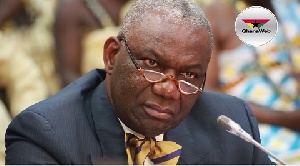 Energy minister, Boakye Agarko
Energy minister, Boakye Agarko
The Coalition of Stakeholders on the ECG Concession Arrangement (COSECA), has hinted at a possible danger with regards to the Millennium Challenge Compact.
According to the coalition, “Ghana stands the risk of losing the whole Compact and in effect derailing the Power Sector reforms ongoing.”
In a statement released on Thursday, COSECA said a number of developments have jeopardized the process.
“We have been part of the push which led to the President declaring that 51% of the Concession will be owned by Ghanaians, we also have turned some of our members from an outright rejection of the concession to a principled acceptance.
“In recent weeks however, all indications and information reaching us including published information suggest that the Compact is heading for a crash and we may miss the September 2018 deadline, and lose the 500 million US Dollars plus infusion of capital and expertise to strengthen our power sector and ensure we never return to Dumsor,” it noted.
Highlighting their claims, the coalition said “some of the concessionaires such as the French electricity conglomerate, EDF, the French transnational company Veolia and their local partner CH Group who put in a joint bid for the ECG concession, have flatly refused to comply with the President’s directive for the Concessionaire to be 51% owned by Ghanaians, and yet it appears the rules are being bent to accommodate them.
“This position was communicated in a letter dated February 12, 2018 and signed by Kelvin Dadzie of CH group. This fact is well known amongst the key parties and was published in the B&FT publication of February 20, 2018.”
It added that “Four days after the above letter, MiDA on the February 16, 2018 wrote to all bidders altering the time table to the effect that, bidders will not need to have Ghanaian stakeholders with 51% equity by September 2018, as originally agreed, suggesting that this requirement will be put off till December 2018, after a bidder has been announced as the winner.
“We don’t see how a winner can be picked without the Ghanaian partner and how 51% Ghanaian ownership can be effected after everything is signed off. This is a blatant attempt to ignore our President’s declaration and muscle Ghanaians out of the agreement. We need to resist this.”
COSECA believes that “the entire Compact will be lost if we miss the September 2018 deadline because the US Government will withdraw the funds. By their letter of 16th February, MiDA upset the process by extending the deadline to 31st December 2018. This position totally jeopardized the Compact because after September there will be no funds and confuses bidders.”
“MiDA should withdraw that letter and allow the original dates to stand. We suspect that failure to define the process for the 51% Ghanaian ownership informed the changes. Unfortunately, it is still not clear how that Presidential declaration will be enforced and effected.”
Background
Under the Millennium Challenge Account, Compact II Power agreement Ghana is supposed to receive an amount of $500 million.
However there are far reaching, sweeping changes in the Power sector which will lead to the privatization of Ghana’s electricity distributor ECG.
The erstwhile John Mahama government signed the compact but did not have peace with workers of ECG until the NDC party lost power in 2016.
The workers organized series of strikes and demonstrations at a time when the country was already enduring power crisis popularly called 'dumsor'.
The then opposition NPP supported workers and promised it would take a second look at the compact agreement when voted into power.
Having won power in the 2016 elections, President Nana Akufo-Addo has attempted to review portions of the contract.
Instead of the 25-year lease, the prospective owners of ECG will now have 20 years within which to own the power distributor.
The president also assured that the workers will no longer be laid off after five years. In what was meant to be the biggest news from the negotiation, the company when privatized will have 51% of it owned by Ghanaian private sector.